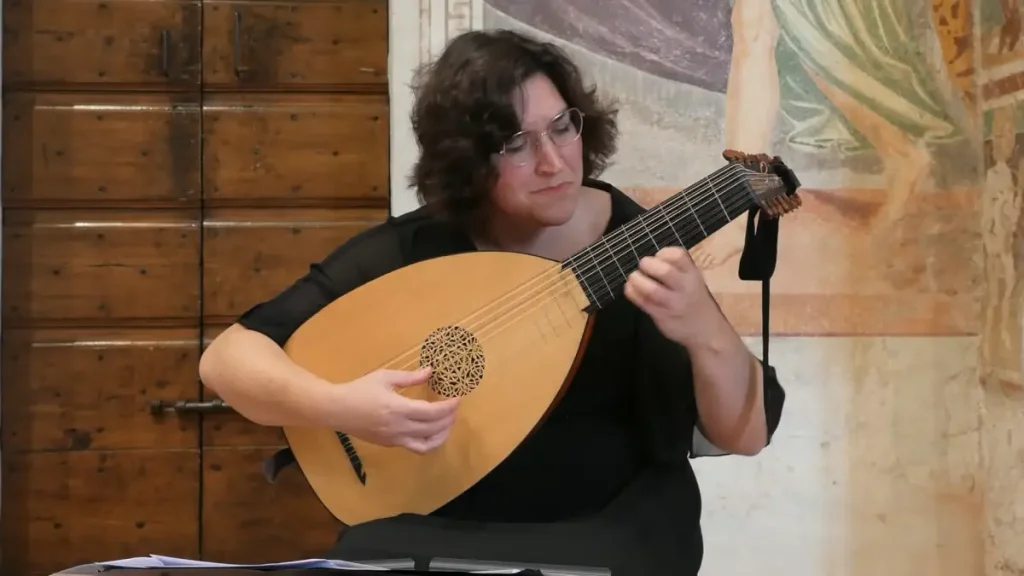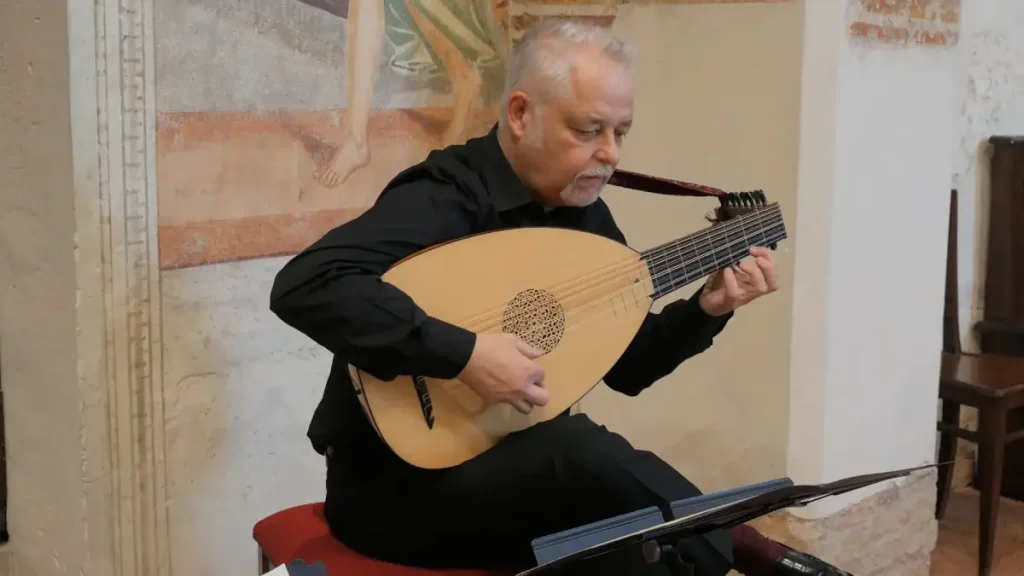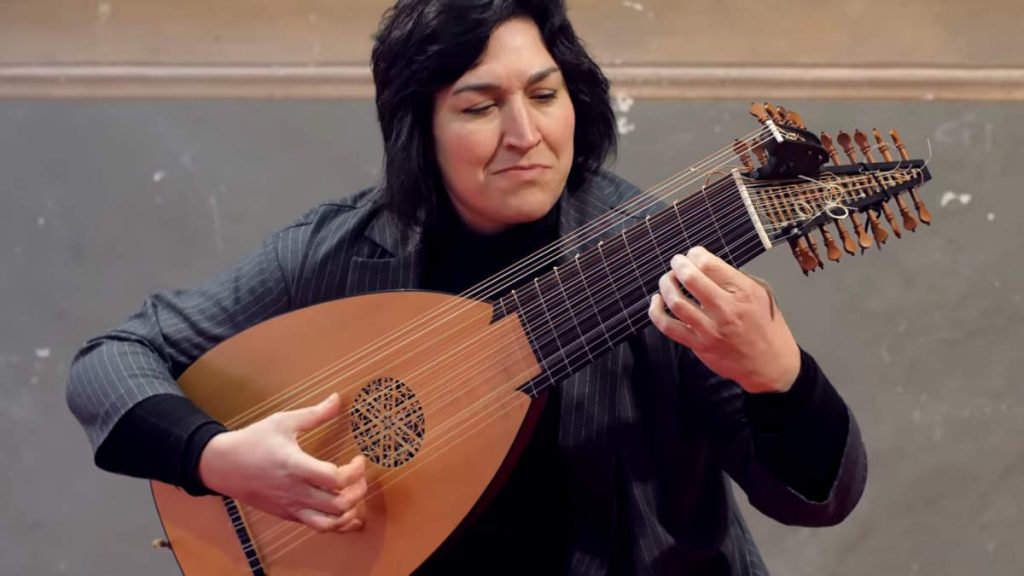Argentine lutenist Evangelina Mascardi and the Italian lutenist Frédéric Zigante play pieces from the English Renaissance composer, lutenist, and singer John Dowland and his contemporaries.
Program
With start times in the video:
- 00:00 Anonymous – A ground. A ground is a piece built on a repeating bass pattern (like an ostinato) over which variations or melodies unfold. This anonymous example is likely from late 16th- or early 17th-century England, where grounds were a favorite vehicle for showing off both virtuosity and invention. Expect a steady, cyclical bass line with ornamental passages above, meditative but also intricate.
- 02:53 A Fancy by John Dowland (1563 – 1626). A fancy (or fantasia) was a free, imaginative piece for lute or viols. It usually moves through different textures and moods without a strict dance rhythm. Dowland’s Fancies are intricate, contrapuntal, and intellectual – like musical essays showing the composer’s mastery.
- 04:15 Mrs. Clifton’s Almain (John Dowland). The almain (or allemande) is a stately dance of German origin, popular in Elizabethan England. This one, dedicated to a noblewoman, combines elegance with steady rhythm, likely used for social dancing but also suitable for performance.
- 06:06 The Right Honourable The Lady Clifton’s Spirit (John Dowland). Another dedication to a member of the Clifton family, this piece is more introspective. The word Spirit suggests something lighter, perhaps more personal than the almain. It is gentle, graceful, and reflective of the refined taste of Dowland’s patrons.
- 08:45 Robin (John Dowland). A lighter, folk-like piece, sometimes known as “Robin is to the Greenwood Gone,” Robin is a popular tune in Renaissance England. Dowland’s lute setting captures a rustic, playful atmosphere. This would have been instantly recognizable to his audiences.
- 11:18 Forlorn Hope Fancy (John Dowland). One of Dowland’s most famous instrumental works. It’s a profound, melancholy fantasia that explores chromaticism and unexpected harmonic turns. The title suggests despair (forlorn hope was a military term for a doomed mission), and the music has a haunting, almost tragic intensity.
- 14:43 A plaine Song by Thomas Robinson (c. 1560 – 1610). A contemporary of Dowland, Robinson was also a lutenist and teacher. His surviving works are fewer, but his instructional book The Schoole of Musicke is a valuable source. A plaine song refers to a simple, chant-like melody, often used as a cantus firmus (a fixed line around which counterpoint is built). Robinson’s setting is straightforward, clear, and less ornamented than Dowland’s, intended to highlight the purity of line and harmony.
- 17:03 Anonymous – La Rossignol. La Rossignol (“The Nightingale”) is an anonymous lute piece, probably French or English, imitating birdsong. Such “character pieces” were popular, using quick trills and ornaments to suggest the call of a nightingale. Expect lively, sparkling passages with playful echoes of nature.
Evangelina Mascardi

Maria Evangelina Mascardi is an Argentinian lutenist, guitarist, and theorbist, today based in Orte, Italy, where she serves as professor of lute at the Conservatorio Antonio Vivaldi in Alessandria.
Born in Buenos Aires in 1977 into an Italian family from Liguria, Mascardi first studied classical guitar, graduating from the National Music Academy Juan Pedro Esnaola under Silvia Fernandez and Gabriel Schebor. She began her performing career in Argentina and qualified as a state-certified music teacher. In 1997, she moved to Europe to specialize in early plucked instruments.
At the Schola Cantorum Basiliensis in Basel, Switzerland, she studied with the renowned Hopkinson Smith, graduating in 2001 with the prestigious “Solisten Diplom.” She later earned another degree while continuing her solo career under the guidance of Tiziano Bagnati at the Benedetto Marcello Conservatory in Venice.
Mascardi has established herself both as a continuo player and soloist. She has accompanied leading figures such as Jordi Savall, Andrea Marcon, Giovanni Antonini, and Simon Rattle, participating in over 30 CD recordings. While her early career emphasized continuo work in major ensembles, she has more recently concentrated on solo lute performance, though she continues to collaborate with groups such as Ensemble Zefiro under Alfredo Bernardini and the Monteverdi Choir led by John Eliot Gardiner.
Her reputation rests especially on her interpretations and recordings of Johann Sebastian Bach’s complete lute works and the music of Sylvius Leopold Weiss, both pillars of the Baroque lute repertoire.
In addition to her concert activity, Mascardi has built a strong teaching profile. Since 2010, she has been professor of lute at the Conservatorio Antonio Vivaldi in Alessandria. She is also artistic director of the Early Music Course Ottaviano Alberti in Orte, Italy, contributing to the preservation and renewal of early music performance.
Frédéric Zigante
Among the guitarists of his generation, Frédéric Zigante is known for his multifaceted career, which combines research, concert activity, recording, and teaching, always avoiding the clichés often associated with the guitar.
Born in France in 1961 and raised in Turin, he studied with Alirio Diaz, Alexandre Lagoya, and Ruggero Chiesa, graduating from the Milan Conservatory. He also studied lute and basso continuo with Massimo Lonardi and the renowned Argentine lutenist Evangelina Mascardi, with whom he also performs in duo.
He began his international concert career at a very young age, performing in countries including Great Britain, Hungary, Greece, Spain, Germany, France, Switzerland, Japan, the Netherlands, Norway, China, Poland, Malaysia, Slovenia, Singapore, as well as throughout Italy. His career has taken him to venues such as Tokyo’s Suntory Hall and Amsterdam’s Concertgebouw.

Alongside his intense recording activity (24 CDs for labels such as Frequenz, Arts, Stradivarius, Adda, Naxos, Brilliant, Musique en Wallonie, and Deutsche Grammophon), he has made radio recordings for the BBC, Radio France, Radio Suisse Romande, and RAI. His discography includes the complete original works for solo guitar by Niccolò Paganini, the complete lute works of Johann Sebastian Bach, two complete recordings of Heitor Villa-Lobos’s guitar works (1994, Stradivarius; 2011, Brilliant), and the complete guitar music of Joaquín Turina and Federico Mompou.
A specialist in the early 19th-century repertoire-often played on period instruments, he has carried out research on performance practice and style. This work has resulted in both studies and articles, as well as recordings of Paganini’s complete works for solo guitar (4 CDs), Mauro Giuliani’s Rossiniane (2 CDs), vocal and guitar works by Ludwig Spohr, and unpublished pieces by Napoléon Coste.
Equally strong is his interest in 20th-century guitar music. He has given world premieres of works such as the Concerto for Guitar and Strings by Boris Asafiev and Alexandre Tansman’s Concertino pour guitare et orchestre, Ballade, Passacaille, as well as Italian premieres of Frank Martin’s Poèmes de la mort, Leo Brouwer’s Hika, and Steve Reich’s Electric Counterpoint. He was also responsible for rediscovering Tansman’s Concertino pour guitare et orchestre (1945), performing its world premiere in 1995 and making its first recording.
Zigante twice recorded the complete guitar works of Villa-Lobos (1994 and 2011), carefully comparing manuscripts for the first time. This research led Éditions Max Eschig in Paris to entrust him with the critical edition of Villa-Lobos’s complete guitar works. During this work, Zigante uncovered a completely unknown piece by the Brazilian composer, the Valse-Choro, conceived as an early version of the Suite populaire brésilienne.
Having reached artistic maturity, he has devoted much energy to the study of original guitar literature. He has published about forty volumes with Éditions Max Eschig (Hal Leonard), Ricordi, Schott, and Bèrben. For Eschig, he directs the series The Best of… (ten monographic volumes dedicated to Tárrega, Sor, Giuliani, Paganini, Carulli, Villa-Lobos, Tansman, Pujol, Brouwer, and Rodrigo).
He also directs Eschig’s Guitar Library (including the important Anthologie de la musique française du XXe siècle) and the guitar section of the Signature series, for which he has published critical editions of Villa-Lobos’s complete works for solo guitar (four volumes) and Leo Brouwer’s Études simples. He is currently publishing the critical edition of Alexandre Tansman’s guitar works. For Bèrben, he directs the Collection Ida Presti-Alexandre Lagoya (ten volumes published). His editorial work is marked by a scientific approach to the musical text.
Alongside his concert and research career, he has always pursued teaching, which he particularly enjoys. After winning a national teaching competition in 1994, he taught for 14 years at the Conservatorio “Giuseppe Tartini” in Trieste, then for another decade at the Conservatorio “Antonio Vivaldi” in Alessandria. He is currently professor at the Conservatorio “Giuseppe Verdi” in Milan. He gives numerous masterclasses in Italy and Europe and has been invited to serve on juries for the most prestigious performance competitions.
Frédéric Zigante is a member of the Scientific Committee of the Fondazione Cecilia Gilardi, which awards scholarships to talented young people in scientific, humanistic, and artistic disciplines.
Sources
- Frédéric Zigante’s official website
- Evangelina Mascardi’s official website
